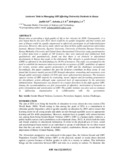Lecturers’ Role in Managing GBV Affecting University Students in Kenya

View/
Date
2014Author
Judith S.K* 1 , Achoka, J. S. K 2 . & Wafula, J. A 3
Metadata
Show full item recordAbstract
Kenya aims at providing a high quality of life to her citizenry by 2030. Consequently, it is
also hoped that by the year 2015, there would be no gender inequality and that women and
men of Kenya would be equally empowered to effectively participate in all industrialization
processes. However, this survey study which was done in three public and private universities
(namely, Maseno University, Egerton University, University of Nairobi, Daystar University,
Kenya Methodist University and United States International University) using questionnaires
to collect data from a sample of 144 lecturers, that were analyzed and synthesized both
qualitatively and quantitatively, found out that there is an obstacle to educational
development in Kenya that needs to be obliterated. This obstacle is gender-based violence
(GBV) as affirmed in the field findings by 36.8% of lecturers. The study was prompted by the
need to establish the measures taken to prevent the occurrence of GBV, modalities of support
for victims, actions taken against perpetrators of GBV and the challenges encountered.
Accordingly, this paper examines the part the lecturers contribute in these areas. It was
found that lecturers mainly prevent GBV through education, counseling and awareness even
though public university students (21.6%) take more self-protection measures. The lecturers
support victims of GBV majorly by counseling, moral support and forwarding perpetrators
for disciplinary action although some expressed lack of empowerment by the university
administration. Stigmatization was found to be a major drawback in the fight against GBV.
Among the recommendations are fast prosecution of offenders, involvement of lecturers in
policy formulation and sensitization on GBV. The gender institute was also seen as strategic
in addressing stigmatization in collaboration with the government.
